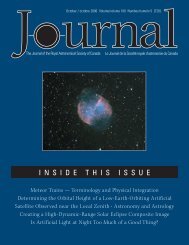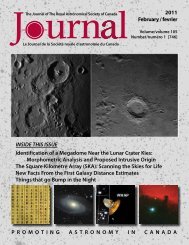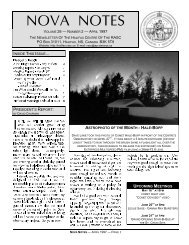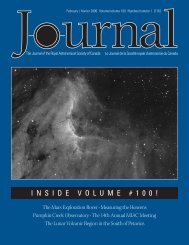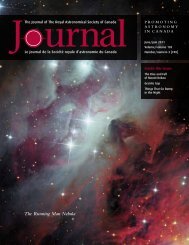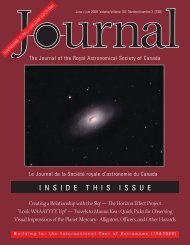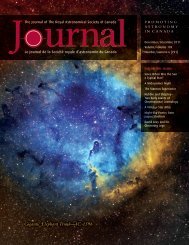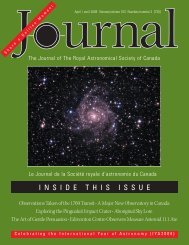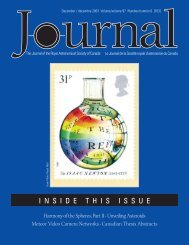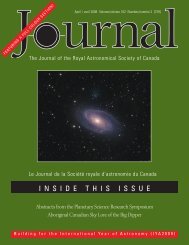Toronto on October 14 th , 2000, severalmembers of the RASC received theirMessier & NGC Certificates. Recipientsof the Messier Certificates were ArnoldL. Rivera (Edmonton), Paul Ellard(Okanagan), Lawrence J. Burgess (Windsor),and David Marchand (Windsor). Recipientsof the NGC Certificates were Arnold L.Rivera (Edmonton), Guy Mackie(Okanagan), and Ron Scherer (Okanagan).Congratulations to everyone on completingthe requirements for the certificates, andmay your next venture take you to thenext level.Paul Boltwood (Ottawa Centre), ofStittsville, Ontario has been honouredwith an asteroid named after him. Thisis the citation, forwarded from Brian G.Marsden of the IAU Minor Planet Centre:(8785) Boltwood — A series of stacked imagestaken on October 25 th , 2000 with a totalexposure of 76 minutes (image by Paul Boltwoodwith his 16-inch Newtonian telescope andhomebuilt CCD camera).From MPC 41384 on Oct. 13: (8785)Boltwood = 1978 RR1, discovered 1978Sept. 5 by N. S. Chernykh at the CrimeanAstrophysical Observatory. Paul Boltwood(b. 1943) is a Canadian specialist incomputer systems and outstanding amateurastronomer. He monitored the peculiarobject OJ 287 for some two years. He alsoobtained deep-sky CCD images with limitingmagnitude 24.5 using a home-built 0.4-m reflector. Congratulations, Paul, for agreat personal accomplishment and forall of us in Astronomy.David Levy, at the fall meeting of theAmerican Association of Variable StarObservers (AAVSO), was awarded theWilliam Tyler Olcott Award. This newaward of the AAVSO is intended to honourindividuals who have had an impact inincreasing the public awareness ofastronomy and variable stars.Astronomical Society of the Pacific Awards 1Two Canadian astronomers, one professional (PeterStetson, Victoria Centre) and one amateur (PaulBoltwood, Ottawa Centre), receive awards from theAstronomical Society of the Pacific.Maria and Eric Muhlmann AwardPeter B. Stetson of the Dominion AstrophysicalObservatory is this year’s recipient of theMaria and Eric Muhlmann Award, givenannually for recent, significant observationalresults made possible by innovative advancesin astronomical instrumentation, software,or observational infrastructure. He is theauthor of one of the most widely used (andpraised) data-reduction packages inastronomy — his DAOPHOT was firstdescribed in the astronomical literature in1987. The program, which can preciselydetermine the brightness of point sourcesimaged with area detectors, was specificallydesigned for measuring stars in very crowdedglobular cluster fields. DAOPHOT allowsfor the two-dimensional characterizationof the brightness distribution of a pointsourceand then applies this “point-spreadfunction”to all objects in a CCD image.Overlapping stellar profiles can be accuratelydeconvolved by fitting the point-spreadfunctionsimultaneously to many objectsin an image. The development of DAOPHOTwas as significant to the advances in thestudy of globular clusters as was the availablityof CCDs. DAOPHOT has been steadilyimproved in the decade since its introductionwith its latest incarnation named ALLFRAME.Stetson has put his code to good use andhas been one of the leaders in the broadfield of globular cluster studies. He has alsoplayed a major role in the steady refinementof our knowledge of the absolute age of theGalaxy and the distribution of ages in thehalo of the Galaxy — this latter work is keyto understanding the early epoch in theformation of the Galaxy.Steven VogtAmateur Achievement AwardPaul Boltwood has been an amateurastronomer for forty years. He is this year’srecipient of the Society’s AmateurAchievement Award in recognition of hisindividual accomplishments in thedevelopment of hardware and software forprecise deep-sky imaging, his research onbrightness variations in active galactic nuclei,and his studies of near-nucleus activity inComet Hyakutake. In May 1998 Boltwood1Reprinted with permission from Mercury and the Astronomical Society of the Pacific.obtained the deepest image ever obtainedwith amateur equipment — a V magnitudeof 24.1 collected over a twenty-hour period.Prior to the invention of CCD imaging, eventhe 200-inch Palomar telescope could onlyachieve a limiting magnitude of 23. Boltwood,however, used a 40-cm, homebuilt telescopeand CCD camera located in his backyardobservatory in suburban Ottawa, Ontario,Canada. What is notable about hisaccomplishments is the care and attentionto detail he applies to his research. He strivesfor the best possible standard of care andachieves professional-quality results. Hisnomination included letters ofrecommendation from astronomers at YaleUniversity, the University of Colorado, theUniversity of Toronto, and the RoyalAstronomical Society of Canada. He haspublished numerous scientific papers andhas collaborated with researchers at a numberof institutions throughout the world. Theaward committee was particularly impressedwith the breadth and sustained nature ofPaul Boltwood’s contribution to astronomy.He is a model of how amateurs can makeunique and valuable contributions to science.Wayne Rosing256JRASC December / décembre 2000
A Candle in the Darkby Bill Broderick, Kingston Centre (broderic@kos.net)Illustration by Brian G SegalMy “Candle in the Dark” projectbegan a few months ago whenI conceived the idea of writingan astronomy column for an astrologypublication. As it happens, I have a friendwho publishes an astrology newsletter,and she is also interested, somewhat, inastronomy. She has actually taken a popularastronomy course and so knows moreabout astronomy than most astrologersI have met. She is particularly fascinatedby eclipses (as they pertain to astrology)and has become something of an experton them, particularly on the Saros cycle,the 18-year period after which solar andlunar eclipses tend to repeat themselvesunder nearly the same conditions.She had already published severalitems I had written, so the idea of a regularcolumn appealed to her. I dashed off threeone-page essays for the upcoming fallmonths, and we were in business. Overthe summer, with all kinds of other thingsgoing on, ideas still came fast and furious,and before the season was over I hadenough essays to go for a couple of years(if it lasts that long).Why an astronomy column in anastrology newsletter? Well, astrologers(at least the ones I have known) tend tobe fairly smart people. They are notuneducated. Some ofthem even run reasonablysuccessful businesses orfollow professionalcareers in various fields.In other words, a lot ofthem are not dummies.(Considering the sheeramount of informationand work that used togo into setting up astandard horoscopebefore the age ofcomputers, astrologershad to be smart then,and I think most are stillsmart now.) They justhappen to believe fervently in astrology.By extension, they have an interest inastronomy, although they usually do notknow that much about it. Astrologers areyour classic “seekers of truth.” They believethey have found it in astrology.What exactly do astrologers believe?Tenets of AstrologyCarl Sagan, one of the most brilliantscientific popularizers of science andastronomy of our time, once made referenceto the “tenets of astrology.” I have neverbeen able to find them anywhere, but Ionce studied astrology, so I wrote up myown. My astrology friend agrees withthem, so here they are:1. Life and events on Earth and in ourlives are influenced by forces and eventsin the cosmos.2. The Sun and planets, individually andin combination, are the major sourcesof cosmic influence.3. The influence of each planet is differentbut is altered or coloured:a) by its position on the zodiac (thatis, the ecliptic, the apparent pathof the Sun in the sky),b) by its position in the houses (the12 divisions of the sky whichsupposedly rule various aspectsof our lives. These begin at theeastern horizon, continue aroundunder our feet to the westernhorizon, and continue over ourheads and back to the easternhorizon), andc) by the angles (or aspects) it makesrelative to other planets (trines,squares, sextiles, conjunctions,oppositions, etc.).4. Certain points, such as the rising pointand mid-heaven, lend particular strengthor emphasis to a planet which happensto be situated there at the moment ofbirth.5. The 12 signs, Aries, Taurus, Gemini,etc., begin at the point of the vernal(spring) equinox, where the Sun (onthe ecliptic) crosses the celestial equatoron or about March 21 each year.Traditionally, this is the First Point ofAries.6. The 12 houses begin at the point onthe ecliptic that was on the easternhorizon at the moment of birth.7. Signs are labeled “Air”, “Earth”, “Fire”and “Water”, and are further labeled“Cardinal”, “Fixed” and “Mutable.”These terms are derived from supposedqualities of the signs, which modify orcolour the influence of the planets.“Very often we even resentthe implication that it is abelief. We do not believe, weknow. Certainly, astrologersare convinced that theirs isnot just a belief but ancientknowledge. They also thinkthat they have personallyverified it and that, therefore,they know, they do notbelieve.”December / décembre 2000 JRASC257



